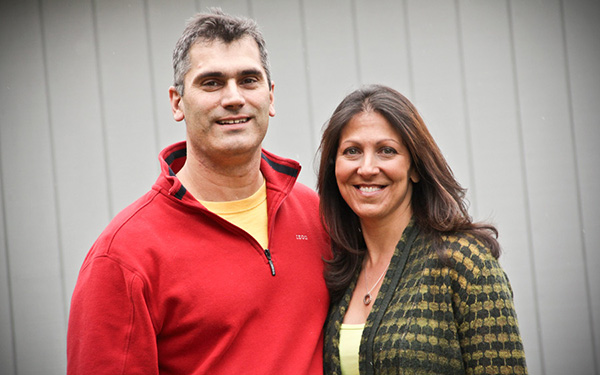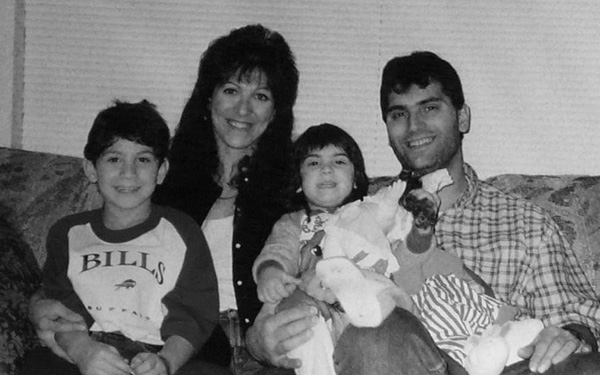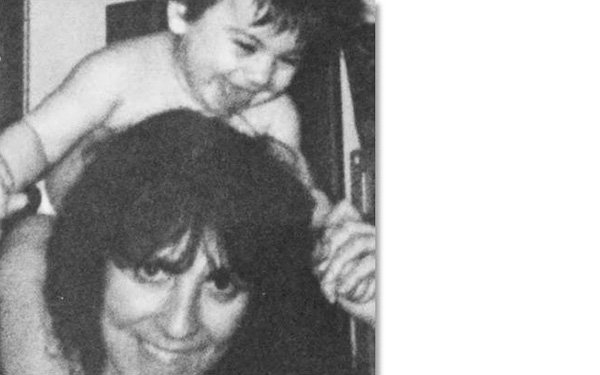My Daughter, My Son: How School Bullies and State Laws Changed the Way I Saw My Transgender Child

This is one in a series of articles surveying the complexities of gender identity, the evolving political debate surrounding the transgender rights of today’s youth, and the ways in which these issues intersect with the policies and practices of K-12 schools across the country. To see the complete series, please visit The74million.org/Series/Transgender-Students.
For the first 45 years of my life, I never thought about gender.
Gender was something I took for granted because I was comfortable expressing my gender and fulfilling my gender roles (as expected by society and those around me). All that has changed now that I’ve seen how my son, and others like him, must think about gender all the time.
Let me explain. I’m the proud mom of two young men, but I didn’t always know I had two sons. For 15 years, my husband and I believed we were raising a daughter. Our younger child, who we now know is our son, is transgender.
Over the years I’ve been criticized and asked countless questions about my teenager, such as, “How could a child possibly know who they are or what they want at that age?” and “What kind of parent would allow their child to make irreversible changes to their body with hormones and surgery?”
I get that. I had those questions too. And a whole lot of others.
If you asked me several years ago what it means to be “transgender,” I couldn’t have provided a good answer. I had no concept of the struggles and pain he and our family would face. I’ve learned a lot over the years, and what I’ve learned has completely changed me. My husband and I have documented our journey in the book, Allies & Angels: A Memoir of Our Family’s Transition.

Terri Cook with her husband Vince. (Photos courtesy Terri Cook)
When my son was growing up (and when we still thought he was our daughter) he was happy, healthy, and full of life. He was never a fan of dresses or dolls or stereotypical “girl things” but that didn’t matter to us. He’d wear t-shirts and jeans and was free to participate in the activities that interested him. He preferred to wear his big brother’s hand-me-downs and politely tossed aside the adorable dresses, bows, and “all things pink” that I preferred.
In 4th grade, the moms of some of his friends asked what we were doing as parents to raise a daughter with such high self-esteem that she didn’t get caught up in “girl drama,” didn’t care about wearing makeup, buying clothes, or trying to fit in with the popular girls. We often wondered the same thing, but never dreamed that he wasn’t caught up in “girl drama” because he wasn’t a girl.
Our son was a straight-A student, a social butterfly, and involved in scouts, sports, student council, and countless clubs and activities. We were proud and grateful to have a happy, healthy, loving, and successful child.
But in adolescence everything changed.
He was 11 or 12, at the onset of puberty and middle school, when the depression, anxiety, and social isolation began. Each day became more and more of a struggle. Although I saw the changes, I had no idea how much pain he was in and the internal (and external) battles he faced every day.

The Cook Family
By middle school he no longer fit in. He didn’t look, dress, or carry himself like his peers expected him to as a girl, and so he was relentlessly teased and bullied. Kids asked if he was a boy or a girl, knocked him down in the hallways, laughed at him, called him “a freak” and “a loser” and told him he’d be better off dead. He never let us know how bad it was, and it was years later before we learned the horrific details of all the awful things that were said and done to him.
I’ll never forget the night when I found him, covered in blood. He had given up all hope and didn’t believe his life could ever get better. He wanted to end his life and end the pain. My beautiful child attempted suicide. His struggle to understand, accept, and simply be who he is, nearly cost him his life.
The challenge for my son, and all transgender people, is not just being born in a body that doesn’t match who they know themselves to be. The challenge is compounded by how they are perceived and treated in society for being who they are. 41% of transgender people attempt suicide (as compared to 1.6% of the general population.) That frightening number skyrockets to 51% if the person is subjected to bullying or harassment, and to 61% if they are the victim of physical assault. (Check out The Seventy Four's Flashcard on confronting bullying in schools.)
For my son and many other transgender youth, it’s not just about being bullied at school – it’s about not being able to conceive of a future where they can be accepted, safe, equal members of society.
Our son continued to withdraw, yet we still didn’t know or understand that he was transgender. He didn’t just wake up one morning and profess he was a boy, not a girl. Rather, he endured depression, anxiety, bullying, and torment for nearly two more years before any of us understood that his gender identity was the source of his pain.
We were desperate to understand why our child was struggling and so unhappy. We sought the help of many professionals – doctors, therapists, a psychiatrist who prescribed anti-depressants and anti-anxiety medication, teachers, school counselors and other educators. None of these professionals ever said, “Hey, do you think you may be a boy and not a girl?” We just didn’t know it was possible for our child to have a male brain inside a female body. Many of the professionals we worked with didn’t know either, or they had some awareness but not enough experience to recognize the signs.
I now hold my hand up and profess to the world that I was ignorant. Ignorance is not the same as intolerance. Ignorant is defined as “lacking knowledge, information, or awareness about something in particular.” Many good people simply have not been exposed to information and experiences different from their own. My husband and I had a lot of misconceptions about what it means to be transgender. Having never met or known a transgender person, and having had no reason to learn or understand, we remained ignorant.
These days we see, hear and read more than ever about transgender people. Yet society has a long way to go. Most of us still do not talk about or learn about gender. Many often conflate gender with sex or sexual orientation.
Our son came out to us gradually over time. First he told us he was a lesbian. He was getting comfortable and testing our reaction—to see if it was safe. Would we accept it and him? Would we still love him? But he was also figuring it out and coming to terms with it himself. It was many months later before he came out to us as transgender—that he was really a boy, despite being assigned female at birth.
He was finally able to put words to the struggle going on inside him. He learned what it means to be transgender, and although he resisted for a while, he knew that that’s what he is. He is a boy who was born with a body that society (and his parents) always told him is the body of a girl.
He was relieved to finally have a word to describe himself; however, he wasn’t relieved or happy to be transgender. This was NOT something that he wanted or chose—nobody would choose such a difficult path in life. He fought it and tried desperately to live as a girl, to fit in, to not be different. He tried to be someone that he wasn’t and it nearly killed him.

Terri and her son
My husband and I started out as many parents do, full of fear and ignorance. I was uncomfortable. At first I didn’t want this for my son’s life or my own. I wondered who would love my child the way he deserved to be loved. I was worried about what family, friends, colleagues and even strangers would say. I didn’t know how to explain what was happening or how to effectively advocate for my child. I felt alone, afraid and overwhelmed.
Later, as I learned more about the violence, rejection, suicide, depression and discrimination faced by transgender people, I became even more afraid.
However, despite our fear and discomfort, my husband and I committed to learning what we needed to learn and to finding support and resources. We love our child unconditionally, and we needed to learn how to best support him, save his life, and give him hope for a better future.
Saving My Son
My husband and I are engineers—the fact-finding, list-making, “show me the research and the science” kind of engineers who need to delve deep, analyze the pros and cons, and seek out experts in the field.
While we immersed ourselves in the research, and sought professionals experienced treating transgender youth, we allowed our son to begin living as a boy in our home. This was a social transition, not medical, and completely reversible. He got a short haircut and a “male” wardrobe and we began using male pronouns and the new male name he had chosen for himself. We thought this was a simple gesture that would allow him to be more comfortable while we educated ourselves. Little did we realize that this experience would teach us our greatest lesson, and that his life depended on it.
As we allowed our son to live as a boy, and be affirmed and treated as who he knew himself to be, we watched him start to live again. We saw the light come back into his eyes and the depression begin to lift. He began to stand up straighter and look us in the eye again. His smile returned. He started to laugh and interact with his family again. He didn’t hide in his room anymore.
Rejecting or suppressing a transgender child’s true identity robs them of their childhood and adds tremendously to the burden of transition later in life. I know this with absolute certainty. I am confident that anyone who lived through, observed, and learned what I’ve learned would come to the same conclusion. We hope our story can help others learn too, because that will save and change thousands of lives.
For years my life revolved around helping my son finally be able to live as the young man he always knew himself to be. It was a long and difficult process. There was bullying and rejection and discrimination along the way. We moved to another city, changed schools multiple times, and had to educate countless people — including healthcare workers, educators, and court officials.
As parents, we succeeded.
My son is now happy and healthy. He’s a full-time college student, has a steady job where he was promoted to manager, is in a wonderful relationship, and is living his life fully as the young man I now know he has always been.
But my focus has changed now.
I no longer want to change my son so that society sees him as a man and accepts him. Instead, I want to change society and our laws so that he (and all transgender people) can be seen for the remarkable human beings they are.
Today, I am a full-time advocate for change. I have two sons. Both are college students. Both are hardworking, loving, kind, thoughtful, and giving. Yet my two sons are not treated equally under the law in our state. One of my sons is protected from discrimination and violence, while the other is not. So I advocate not only for my child, but for the entire transgender community, demanding access to healthcare, education, economic security, and the freedom to move about this world without fear of state-sanctioned discrimination and violence. More than that, I advocate for dignity, respect, justice, compassion and love that all people should be entitled to.
Being the parent of a transgender child has changed my life. It has changed how I see all people, not just transgender or gender non-conforming people. It has opened my eyes to how much I really don't know about somebody else's life, identity, or experiences. It has made me a more compassionate person who recognizes and respects that my own experiences and identity may not be the same as others’. I am now less judgmental and more open to a new understanding. I try to catch myself whenever I fall into the trap of measuring against society’s norms.
I’m not perfect but everyday I strive to be the kind of person that I hope my children encounter throughout their lives.
Share your reaction to this story, or your own experience, at [email protected]. If someone you love is battling depression or suicidal thoughts, call the National Suicide Prevention Lifeline at 1-800-273-8255.
Terri Cook is the proud mom of a transgender child who transitioned at the age of 15 and the co-author of the book Allies and Angels: A Memoir of our Family’s Transition. She speaks at conferences, corporations, colleges and community organizations across the country and is dedicated to opening hearts and minds by sharing her family’s life-changing journey. She also serves on the board of the Empire State Pride Agenda Foundation. Formerly a project engineer, Terri spent most of her career at Lockheed Martin where she was also a Pride ERG Lead and diversity trainer.
Get stories like these delivered straight to your inbox. Sign up for The 74 Newsletter

;)
